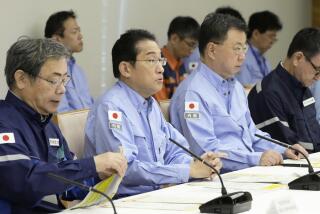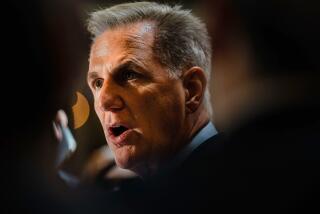Tokyo Test
Keizo Obuchi’s victory celebration following his election Friday as Japan’s next prime minister could be brief unless he moves quickly to address a laundry list of economic problems and structural defects plaguing the world’s second-largest economy.
The Clinton administration joined prominent voices on both sides of the Pacific in warning Obuchi, a loyal if uncharismatic 61-year-old Liberal Democratic Party regular, that he will be judged by how aggressively he attacks his country’s ailing economy, particularly its debt-laden banking system.
Obuchi, who was elected president of the party Friday, is virtually assured of becoming Japan’s next prime minister when the LDP-controlled parliament reconvenes Thursday. He would replace Prime Minister Ryutaro Hashimoto, who resigned last week after his party was badly beaten in upper house elections July 12.
“We look forward to Mr. Obuchi’s economic action plans in the coming weeks,” White House Press Secretary Mike McCurry told reporters Friday. “Some of the positions that he has announced in the past few days, particularly in the area of fiscal policy, seem to us promising. . . . But it’s important that those words be followed up with concrete action.”
Financial market reaction to Obuchi’s selection was decidedly mixed amid criticism that he lacked the will to make tough economic decisions or attack deep-seated interests, of which Japan has plenty.
Early in the day, the U.S. stock market got a bit of a boost from the Obuchi announcement, but that news was quickly overshadowed by domestic concerns over slow corporate earnings. After another day of roller coaster trading, the Dow Jones industrial average closed up 4.38 points at 8,937.36.
Financial skepticism was also reflected in the modest rise of the dollar, which closed at 141.44 yen, up from 141.38 the previous day.
In Tokyo, the Nikkei stock market index closed up 1% Friday at 16,361.89 before the Obuchi election--its first gain of the week--amid rumors that the government may have engineered the run-up.
“Our trading people have been saying they think they’re seeing public money coming into the market,” said Gary Evans, strategist with HSBC Securities.
Analysts said the investment world’s ho-hum reaction reflected the popular sentiment that the promotion of another LDP insider would not lead to a significant turnaround for the moribund Japanese economy.
“Toyota is not better off tomorrow than it was today because of the change in leadership,” said Ulrike Schaede, a Japan finance specialist at the University of San Diego’s Graduate School of International Relations and Pacific Studies. “The personality of the prime minister is not as important as if the [political] regime had changed.”
*
Japan’s worsening economic health is viewed with alarm by economists around the world, who fear the continued weakening of the yen, which has fallen 11% in real terms since March, could spark a further round of Asian currency devaluations and trigger a sharp, global downturn.
“I think the situation in Asia is really tenuous,” said Clyde Prestowitz, the former U.S. trade negotiator who heads the Washington-based Economic Strategy Institute.
A string of troubling economic reports this week further underscored the challenge facing the new Japanese leader. Moody’s, the credit rating agency, hinted at a possible downgrade for Japan. And hopes that the clang of cash registers might pull Japan out of one of its worst postwar recessions were dashed when department stores reported a 6% drop in first-half sales as supermarket revenues fell 3.5%.
The politically sensitive trade deficit, meanwhile, soared 66% in yen terms during the first half of the year to $46.9 billion, including a 37% hike with the U.S. Expectations that Japan might help blunt the crisis in neighboring Asian economies by importing more from them were flattened as total exports rose by 2.2% but imports fell by 9.9%.
Those struggling on Japan’s economic front lines expressed even greater skepticism that Friday’s election would produce real change.
“Everyone from the LDP is the same, and the current LDP is really awful,” said Yuzuru Inoue, a 60-year-old Tokyo shoe store owner. “Now I can’t even afford to give out annual bonuses to my employees, which is really sad. And I don’t think Obuchi can change this.”
Sayuri Ishida, a 44-year old insurance company employee, agreed. “It does not matter any more who becomes the prime minister,” he said. “Obuchi certainly looks like a nicer person than Hashimoto, but I don’t think he is capable enough to be in charge of anything.”
Others saw a silver lining, however. Economic policy in Japan is set by bureaucrats anyway, so prime ministers are less crucial to policy formation than in other countries, said Craig Chandler, strategist with Salomon Smith Barney Japan. “Just because he’s not telegenic and can’t give out one-liners doesn’t mean he won’t be able to push successful policy,” Chandler said.
One of the first steps Obuchi should take to shore up domestic and global confidence is to name an effective finance minister, analysts said. Seiroku Kajiyama--a former LDP Cabinet spokesman favored by the markets who ran against Obuchi--is a possibility, although he reportedly doesn’t want the job.
Another name bandied about is former Prime Minister Kiichi Miyazawa. While such a move would be a step down, there is a precedent. Takahashi Korekiyo, Japan’s prime minister in 1921-22, was convinced later in the decade to accept the financial job to fix the dire 1927 financial crisis. But Miyazawa is 79.
Topping the list of Obuchi’s problems is Japan’s horrendous bank crisis and an estimated $600 billion in bad or questionable loans. Obuchi will be under pressure to ensure rapid passage of a so-called Total Plan designed to attack the bad debt problems, encourage sales of depreciated property securing the loans and inject liquidity into the property market.
Another high-profile element of the bank plan is so-called bridge provisions designed to allow banks to fail without cutting off credit to their worthy borrowers. Look for Japan to try this system out on a small regional bank later this year, said Ronald Bevacqua, economist with Merrill Lynch Japan Inc. But Japan will be reluctant to use the system on large banks, he added.
*
Obuchi will also be under great pressure to push through tax cuts. It was a sales tax increase in April 1997 that many economists blame for killing off a tentative consumer-driven recovery.
If that isn’t enough to keep him busy, Obuchi could turn his sights on a whole range of other structural problems.
“When you talk about an economic overhaul, the financial system is certainly important, but it’s just one part of the problem,” said Harold Rosario, Japan head of Westpac Banking Corp.
Also needed are transparent accounting systems, an end to policies that favor exports over imports, changes that allow markets to link risk with reward and legal changes that streamline bankruptcy rules, analysts said.
*
Magnier reported from Tokyo and Iritani from Los Angeles. Etsuko Kawase of the Times’ Tokyo bureau contributed to this report.
MAIN STORY: A1
(BEGIN TEXT OF INFOBOX / INFOGRAPHIC)
Plenty to Do
Key economic issues facing Keizo Obuchi, Japan’s incoming prime minister:
* Building a credible economic team
Since Obuchi lacks economic expertise, his financial team is key. Possible front-runners for finance minister include his unseccessful challenger, former chief Cabinet spokesman Seiroku Kajiyama, and former Prime Minister Kiichi Miyazawa.
* Reforming Japan’s banking system
The primary task will be to ensure rapid passage of a banking reform plan designed to attack an estimated $600 billion in bad loans, encourage sales of depreciated property securing the loans and inject liquidity into the property market.
* Stimulating the economy
The government is under mounting pressure to get money flowing back into the Japanese economy. Obuchi has promised to implement a $71-billion stimulus package this syear and $42.5 billion in tax cuts next year.
*
SYMPTOMS OF TROUBLE: THE YEN AND THE GDP
Yen per dollar, weekly closes, and gross domestic product, percentage change from previous quarter:
YEN - Friday: 141.44
GDP - 1st quarter: -1.3%
Source: Bloomberg News, Organization for Economic Cooperation and Development
More to Read
Start your day right
Sign up for Essential California for news, features and recommendations from the L.A. Times and beyond in your inbox six days a week.
You may occasionally receive promotional content from the Los Angeles Times.






